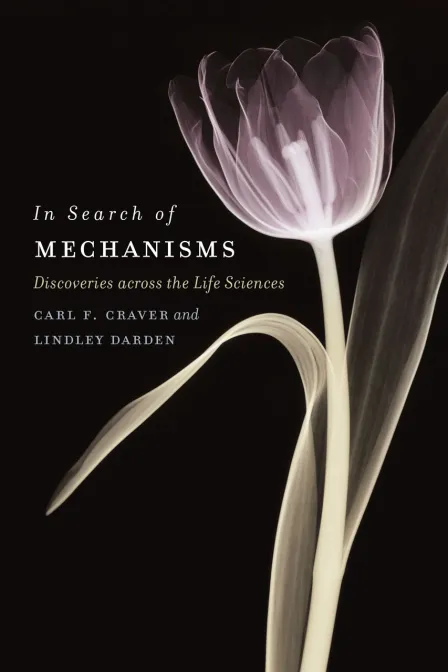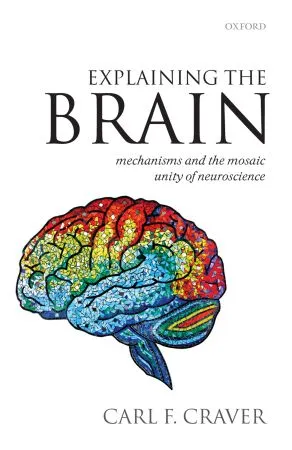Books
J. Bickle, C.F. Craver, A.S. Barwich eds. (2021) Tool Use in Neuroscience. Routledge.
C. Craver and C. Klein (forthcoming) Mind Design III. MIT PRESS.
Craver, C.F. and Darden, Lindley (2013) In Search of Mechanisms: Discoveries Across the Life Sciences, University of Chicago Press.
Craver, C.F. (2007) Explaining the Brain: Mechanisms and the Mosaic Unity of Neuroscience, Clarendon Press: Oxford.
Published Articles
Craver, C.F. “Optogenetics and Maker’s Knowledge” (2022) in J. Bickle, A.S. Barwich, and C.F. Craver eds. Tool Use in Neuroscience. Routledge.
Craver, C.F., and Dan-Cohen, T. (2021) Experimental Artifacts. British Journal for the Philosophy of Science.
Craver, C. F., Glennan, S., & Povich, M. (2021). Constitutive relevance & mutual manipulability revisited. Synthese. https://doi.org/10.1007/s11229-021-03183-8
Mok, Jenkin N. Y., Leonard Green, Joel Myerson, Donna Kwan, Jake Kurczek, Elisa Ciaramelli, Carl F. Craver, and R. Shayna Rosenbaum. (2021) Does Ventromedial Prefrontal Cortex Damage Really Increase Impulsiveness? Delay and Probability Discounting in Patients with Focal Lesions. Journal of Cognitive Neuroscience, July 7, 2021, 1–19. https://doi.org/10.1162/jocn_a_01721.
Craver, Carl F., Mikhail Dozmorov, Mark Reimers, and Kenneth S. Kendler. (2020) Gloomy Prospects and Roller Coasters: Finding Coherence in Genome-Wide Association Studies. Philosophy of Science 87, no. 5: 1084–95.
Dozmorov, M. G., Cresswell, K. G., Bacanu, S.-A., Craver, C., Reimers, M., & Kendler, K. S. (2020). A method for estimating coherence of molecular mechanisms in major human disease and traits. BMC Bioinformatics, 21(1), 473. https://doi.org/10.1186/s12859-020-03821-x
Mok, J.N.Y., Kwan, D., Green, L., Myerson, J., Craver, C.F., Rosenbaum, R. S. (2020) Is it time? Episodic imagining and the discounting of delayed and probabilistic rewards in young and older adults. Cognition. 199.
Craver, C.F. (2020) “Remembering: Epistemic and Empirical” Memory and Philosophy. 11:2.
Craver, C.F. and Kaplan, D. (2020) Are More Details Better? On the Norms of Completeness for Mechanistic Explanations. British Journal for the Philosophy of Science. https://doi-org.libproxy.wustl.edu/10.1093/bjps/axy015
Craver, C.F. (2019) Mechanism and Idealization: A Reply to Bokulich. The Monist. 102:525-530.
Reimers, M., Craver, CF, Dosmorov, M., Bacanu, S. and Kendler, K. (2018) The Coherence Problem: Finding Meaning in GWAS Complexity” Behavioral Genetics. 49:187-195.
Keven, N., Kurczek, J., Rosenbaum, R.S., Craver, C.F. (2017) “Narrative Construction is Intact in Episodic Amnesia” Neuropsychologia. 110: 104-112.
Craver, C.F. and Kirckel, B. (forthcoming) "Mechanism" in Oxford Bibliographies in Philosophy.
Craver, C.F. and Rosenbaum, S.R. (2018) "Consent without Memory" in Michalean, K. ed. New Essays in the Philosophy of Memory.
Povich, M. and Craver, C.F. (2018) "Review of Lange’s Because without Cause" The Philosophical Review.
Reimers, M. and Craver, CF (2018) "The Coherence Problem: Finding Meaning in GWAS Complexity" Behavioral Genetics.
Henry, J. and Craver, C.F. (2018) "Episodic Memory as Epistemic Trump Card" Behavioral and Brain Sciences.
Craver, C.F. and Kaplan, D. (2018) "Are More Details Better? On the Norms of Completeness for Mechanistic Explanations." British Journal for the Philosophy of Science.
Keven, N., Kurczek, J., Rosenbaum, R.S., Craver, C.F. (2018) "Narrative Construction is Intact in Episodic Amnesia" Neuropsychologia.
Craver, C.F. and Povich, M. (2018) "The Directionality of Distinctively Mathematical Explanations." Studies in the History and Philosophy of Science.
Craver, C.F. and Povich, M. (2017) "Levels, Reduction, and Emergence" S. Gennan and P. Illari, eds., Routledge Handbook of Mechanisms.
Craver, C.F. (2017) "The Explanatory Force of Network Models" Philosophy of Science.
Craver, C.F. (2017) "Stochastic Supervenience" in Feest and Biener, eds. Doing HPS with Peter Machamer.
Kaplan, D.M. and Craver, C.F. (2016) "A Registration Problem for Functional Fingerprints" BBS Commentary. 39: e124.
Craver, C.F., Keven, N., Kwan, D., Kruczek, J., Duff, M., Rosenbaum, R.S. (2016) "Moral Judgment in Episodic Amnesia" Hippocampus.
Rosenbaum, R. S., D. Kwan, D. Floden, B. Levine, D. T. Stuss, and C. F. Craver. (2015). "No Evidence of Risk-Taking or Impulsive Behaviour in a Person with Episodic Amnesia: Implications for the Role of the Hippocampus in Future-Regarding Decision-Making." The Quarterly Journal of Experimental Psychology, 1–13.
Craver, C.F. and J. Tabery (2015) "Mechanisms in Science" Stanford Encyclopedia of Philosophy.
Craver, C.F. (2015) "Reflections on Neuro-Memory Studies." Memory Studies. 8: 117-124.
Kwan, D., C.F. Craver, L. Green, J. Myerson, F. Gao, S.E. Black, R. S. Rosenbaum (2015) "Cueing the Personal Future to Reduce Discounting in Intertemporal Choice: Is Episodic Prospection Necessary?" Hippocampus 25: 432-443.
Craver, C.F. (2015) "Levels." OpenMIND project.
Malinowski, S. and Craver, C.F. (2014) "The Spine Problem: Finding a Function for Dendritic Spines." Frontiers in Human Neuroscience. 8: 95 doi: 10.3389/fnana.2014.00095
Craver, C.F., Cova, F., Green, L., Myerson, J., Kwan, D., Rosenbaum, S.F., and Bourgeois-Gironde, S. (2014) "An Allais Paradox without Mental Time Travel" Hippocampus. DOI: 10.1002/hipo.22318.
Craver, C.F. Kwan, D., Steindam, C., and Rosenbaum, R.S. (2014) "Individuals with Episodic Amnesia are not Stuck in Time" Neuropsychologia 57:191-195.
Craver, C.F., Graham, B., and Rosenbaum, R.S. (2014) "Remembering Mr. B" Cortex DOI: 10.1016/j.cortex.2013.11.001.
Kwan, D., Craver, C.F., Green, L., Myerson, J., Rosenbaum, S. R. (2013) "Dissociations in Future Thinking Following Hippocampal Damage: Evidence from Discounting and Time Perspective in Episodic Amnesia" Journal of Experimental Psychology, General.
Romero, F., Craver, C.F., (2013) "Dispositions" The Encyclopedia of Clinical Psychology, Wiley-Blackwell.
Craver, C.F. (2013) "Mechanisms, multilevel" Springer Encyclopedia of Systems Biology.
Craver, C.F. and Bechtel, W. (2013) "Interlevel Causation" Springer Encyclopedia of Systems Biology.
Craver, C.F. (2013) "The Ontic Conception of Scientific Explanation" in Andreas Hütteman and Marie Kaiser eds. Explanation in the Biological and Historical Sciences. Springer.
Kaiser, M. and Craver, C.F. (2013) "Mechanisms and Laws: Clarifying the Debate" in Hsiang-Ke Chao, Szu-Ting Chen and Roberta L. Millstein, eds. Mechanism and Causality in Biology and Economics. Chapter 7.
Craver, C.F. (2012) "A Preliminary Case For Amnesic Selves: Toward a Clinical Moral Psychology" Social Cognition, Vol. 30, No. 4, pp. 449-473.
Kwan, D., Craver, C.F., Green, L., Myerson, J., Boyer, P. Rosenbaum, S. (2012) "Future Decision-Making without Mental Time Travel" Hippocampus 22: 1215-19.
Craver, C.F. (2012) "Functions and Mechanisms: A Perspectivalist Account" (English Version) in P. Huneman, ed. Functions, Springer.
Piccinini, G. and Craver, C.F. (2011) “Integrating Psychology and Neuroscience: Functional Analyses as Mechanism Sketches” Synthese 183: 283-311.
Kaplan, D.M. and Craver, C.F. (2011) "The Explanatory Force of Dynamical Models" Philosophy of Science 78 (4): 601-627.
Craver, C.F. and Kaplan, D.M. (2011) "Towards a Mechanistic Philosophy of Neuroscience: A Mechanistic Approach" Peter French and J Saatsi eds. Introduction to the Philosophy of Science.
Craver, C.F. (2010) "Prosthetic Models" Philosophy of Science. 77: 840-851.
Kendler, K., Zachar, P., and Craver, C.F. (2010) "What kinds of things are psychiatric disorders?" Psychological Medicine. 41: 1143-1150.
Robins, S.K. and Craver, C.F. (2010) "No-Nonsense Neuro-Law" Neuroethics (available online).
Craver, C.F. (2009) "Mechanisms and Natural Kinds" Philosophical Psychology. 22: 575 – 594.
Darden, Lindley and Craver, C.F. (2009) "Reductionism in Biology" In Encyclopedia of the Life Sciences. John Wiley & Sons, Ltd: Chichester
C.F. Craver and Robins, S.K. (2009) "Biological Clocks: Explaining with Models of Mechanisms" Oxford Handbook of Philosophy and Neuroscience. Oxford University Press: Oxford, USA, pp. 41-67.
C.F. Craver (2009) "Neural Mechanisms" in J. Symons and P. Calvo, eds., Routledge Companion to the Philosophy of Psychology. Routledge. N.J. Ch. 24.
C.F. craver (2008) “Functions and Mechanisms in Neuroscience” in P. Poirier, L. Faucher, E. Racine and E. Ennan (eds). Des neurones à la conscience: Neurophilosophie et philosophie des neurosciences. Bruxelles: De Boeck Université.
Craver, C.F. (2008) "Physical Law and Mechanistic Explanation in the Hodgkin and Huxley Model of the Action Potential" Philosophy of Science. 75: 1022–1033.
Craver, C.F. and Alexandrova, A. (2008) "No Revolution Necessary: Neural Mechanisms for Economics" Philosophy and Economics. 24 (3): 381-406.
Craver, C.F. (2007) "Constitutive Relevance" Journal of Philosophical Research. 32: 1-30.
C. F. Craver and William Bechtel (2007) "Top-down causation without top-down causes" Biology and Philosophy. 22: 547-563.
C. F. Craver (2007) "commentary on trout" and "Commentary on Wolffe" Philosophy of Science Archives.
C.F. Craver (2007) "Julius Axelrod" in N. Koertge, ed. Dictionary of Scientific Biography. Gale/Cengage, p. 122.
R.A. Wilson and C.F. Craver (2006) "Realization" in P. Thagard, ed., Elsevier Handbook of the Philosophy of Psychology and Cognitive Science. Dordrecht: Elsevier. 81-104.
C.F. craver (2006) "When Mechanistic Models Explain" Synthese. 153: 355-376.
C.F. Craver (2006) Review of Eliot Valenstein’s The War of the Soups and the Sparks. Isis 97: 803-804.
C.F. Craver and L. darden (2005) "Introduction" Studies in History and Philosophy of Biological and Biomedical Sciences 36:233-244.
C.F. Craver (2005) "Beyond Reduction: Mechanisms, Multifield Integration, and the Unity of Science" Studies in History and Philosophy of Biological and Biomedical Sciences 36:373-396.
To be translated into French for inclusion in J. Gayon and Thomas Pradeu editors, Anthology in Philosophy of Biology. Les Editions Vrin, Paris.
C.F. Craver and W. Bechtel (2005) "Mechanisms and Mechanistic Explanation" in S. Sarkar and J. Pfeiffer, eds. The Philosophy of Science: An Encyclopedia. Routledge Press, pp. 469-478.
C.F. Craver (2005) "T.S. Kuhn" Encyclopedia Americana.
C.F. Craver (2005) "I. Lakatos" Encyclopedia Americana.
C.F. Craver (2004) "Dissociable Realization and Kind Splitting" Philosophy of Science 71:960-971.
C.F. Craver (2003) "The Making of a Memory Mechanism" Journal of the History of Biology 36: 153-195.
B. Towl, J.D. Halverson, and C.F. Craver (2003) "Clark Glymour’s Mind’s Arrows: An Elusive Target" Philosophical Psychology 16: 157-164.
C.F. Craver (2002) "Interlevel Experiments and Multilevel Mechanisms in the Neuroscience of Memory" Philosophy of Science Supplemental 69: S83-S97.
C.F. Craver (2002) "Self Reflection: Review of Gallagher and Shear’s Models of the Self" Philosophical Psychology 15: 213-216.
L. Darden, and C.F. Craver (2002) "Strategies in the Interfield Discovery of the Mechanism of Protein Synthesis" Studies in History and Philosophy of Biological and Biomedical Sciences 33: 1-28.
C.F. Craver (2001) "Role Functions, Mechanisms and Hierarchy" Philosophy of Science 68: 31-55.
C.F. Craver, and L. Darden (2001) "Discovering Mechanisms in Neurobiology: The Case of Spatial Memory" in P.K. Machamer, R. Grush, and P. McLaughlin (eds.), Theory and Method in Neuroscience Pittsburgh, PA: University of Pittsburgh Press. 112-137.
C.F. Craver (2001) "Searching for Common Ground" (Golledge ed., Wayfinding Behavior: Cognitive Mapping and Other Spatial Processes) in Psycholoquy.
E.M. Stricker, C.F. Craver, K.S. Curtis, K.A. Peacock-Kinzig, A.F. Sved and J.C. Smith (2001) "Osmoregulation in Water-Deprived Rats Drinking Concentrated NaCl Solutions: Effect of Area Postrema Lesions" American Journal of Physiology 280: R831-R842.
C.F. Craver (2001) "Structures of Scientific Theories" in P.K. Machamer and M. Silberstein, eds. Blackwell Guide to the Philosophy of Science Blackwell: Oxford, pp. 55-79.
P.K. Machamer, L. Darden and C.F. Craver (2000) "Thinking about Mechanisms" Philosophy of Science 67:1-25.
C.F. Craver and S.L. Small (1997) "Subcortical Aphasia and the Problem of Attributing Functional Responsibility to Parts of Distributed Brain Processes" Brain and Language 58: 427-35.




